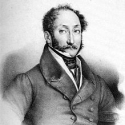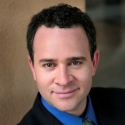The Elixir of Love

|
Gaetano DonizettiComposer |
Domenico Gaetano Maria Donizetti (November 29, 1797 – April 8, 1848) was an Italian composer, best known for his almost 70 operas. Along with Gioachino Rossini and Vincenzo Bellini, Donizetti was a leading composer of the bel canto opera style during the first half of the nineteenth century. Donizetti's close association with the bel canto style was undoubtedly an influence on other composers such as Giuseppe Verdi. Donizetti was born in Bergamo in Lombardy. Although he did not come from a musical background, at an early age he was taken under the wing of composer Simon Mayr who had enrolled him by means of a full scholarship in a school which he had set up. There he received detailed training in the arts of fugue and counterpoint. Mayr was also instrumental in obtaining a place for the young man at the Bologna Academy, where, at the age of 19, he wrote his first one-act opera, the comedy Il Pigmalione, which may never have been performed during his lifetime.
An offer in 1822 from Domenico Barbaja, the impresario of the Teatro di San Carlo in Naples, which followed the composer's ninth opera, led to his move to that city and his residency there which lasted until the production of Caterina Cornaro in January 1844. In all, Naples presented 51 of Donizetti's operas. Before 1830, success came primarily with his comic operas, the serious ones failing to attract significant audiences. However, his first notable success came with an opera seria, Zoraida di Granata, which was presented in 1822 in Rome. In 1830, when Anna Bolena was premiered, Donizetti made a major impact on the Italian and international opera scene and this shifted the balance of success away from primarily comedic operas, although even after that date, his best-known works included comedies such as The Elixir of Love (1832) and Don Pasquale (1843). Significant historical dramas did appear and succeed; they included Lucia di Lammermoor (the first to have a libretto written by Salvadore Cammarano) given in Naples in 1835, and one of the most successful Neapolitan operas, Roberto Devereux in 1837. Up to that point, all of his operas had been set to Italian libretti.
Donizetti found himself increasingly chafing against the censorship limitations which existed in Italy and especially in Naples. From about 1836, he became interested in working in Paris, where he saw much greater freedom to choose subject matter, in addition to receiving larger fees and greater prestige. Starting in 1838 with an offer from the Paris Opéra for two new works, he spent a considerable part of the following ten years in that city, and set several operas to French texts as well as overseeing staging of his Italian works. The first opera was a French version of the then-unperformed Poliuto which, in April 1840, was revised to become Les martyrs. Two new operas were also given in Paris at that time. As the 1840s progressed, Donizetti moved regularly between Naples, Rome, Paris, and Vienna, continuing to compose and stage his own operas as well as those of other composers. But from around 1843, severe illness began to take hold and to limit his activities. Eventually, by early 1846 he was obliged to be confined to an institution for the mentally ill and, by late 1847, friends had him moved back to Bergamo, where he died in April 1848.

|
Felice RomaniLibrettist |
Born Giuseppe Felice Romani to a bourgeois family in Genoa, he studied law and literature in Pisa and Genoa. At the University of Genoa he translated French literature and, with a colleague, prepared a six-volume dictionary of mythology and antiquities, including the history of the Celts in Italy. Romani's expertise in French and antiquity is reflected in the libretti he wrote; the majority are based on French literature and many, such as Norma, use mythological sources.
After refusing a post at the University of Genoa, he appears to have travelled to France, Spain, Greece, and Germany before returning to Milan in either 1812 or 1813. There he became friends with important figures in the literary and musical world. He turned down the post of court poet in Vienna, and began a career as opera librettist. He wrote two librettos for the composer Simon Mayr, which resulted in his appointment as the librettist for La Scala. Romani became the most highly regarded of all Italian librettists of his age, producing nearly one hundred. In spite of his interest in French literature, he refused to work in Paris.
Romani wrote the librettos for Bellini's Il pirata, La straniera, Zaira, I Capuleti e i Montecchi, La sonnambula, Norma, and Beatrice di Tenda, for Rossini's Il turco in Italia and Bianca e Falliero, and Donizetti's Anna Bolena and The Elixir of Love (which he adapted from Eugène Scribe's Le philtre). He also wrote a libretto (originally for composer Adalbert Gyrowetz) that Verdi used for his early comedy Un giorno di regno.
Romani was considered an ideal match for Bellini, who is quoted as having said: "Give me good verses and I will give you good music." Dramatic, even extravagant "situations" expressed in verses "designed to portray the passions in the liveliest manner" was what Bellini was looking for in a libretto, according to a letter to Francesco Florimo, of 4 August 1834, and he found them in Romani.
The two, however, had a falling out over missed deadlines for Beatrice di Tenda. After setting I puritani to a libretto by Carlo Pepoli, Bellini was determined not to compose any more Italian operas with anyone but Romani. I puritani was his last opera; he died less than a year after its première. Romani mourned him deeply and wrote an obituary in which he expressed his profound regrets over their disagreement.
In 1834, Romani became editor of the Gazzetta Ufficiale Piemontese to which he contributed literary criticism. He retained the post, with a break from 1849–1854, until his death, in Moneglia, (in the region of Liguria, Italy). A volume of his lyric poems was published in 1841.

|
José Luis GomezConductor |
The Venezuelan-born, Spanish conductor José Luis Gomez began his musical career as a violinist but was catapulted to international attention when he won First Prize at the International Sir Georg Solti Conductor’s Competition in Frankfurt in September 2010, securing a sensational and rare unanimous decision from the jury.
Gomez’s electrifying energy, talent and creativity earned him immediate acclaim from the Frankfurt Radio Symphony Orchestra where he was appointed to the position of Assistant Conductor, a post created especially for him by Paavo Jarvi and the orchestra directly upon the conclusion of the competition.
In 2016, Gomez was named Music Director of the Tucson Symphony Orchestra. Since taking the helm, the orchestra has seen a marked increase in subscribers and donors to the orchestra and Gomez has worked tirelessly to introduce innovative and exciting new outreach activities whilst continuing to nurture and support existing education projects. For example the unique Young Composers’ Project which sees students new to composing working closely with orchestra representatives to create new compositions, culminating in a public performance and recording. Maestro Gomez is also a champion of many lesser-known composers from South America, programming their works sensitively with more recognised classical names, creating hugely interesting and unique concerts. He has also been responsible for commissioning new works, for example he and the orchestra were co-commissioners of a new concerto for orchestra and trumpet by Arturo Marquez which was given its US premier under Gomez’s baton in 2019.
The 2019/20 and 2020/21 Seasons in Tucson will see Gomez conduct the complete Beethoven’s Symphonies and selected Concertos in a celebration of the composers works in his anniversary year, and additionally in the 2019/20 season he will conduct Mahler’s Symphony No. 2, a selection of works by Rossini with rising star Federica Lombardi, the world premiere of Lopez-Hanshaw’s vokas animo for Orchestra and Chorus, and a gala evening with Renée Fleming. In past seasons Gomez has invited and enjoyed working with such artists as Yo-Yo Ma, Midori, Barry Douglas, Vadym Kholodenko and Gil Shaham.
In The Americas he enjoys a close relationship with the Edmonton Symphony Orchestra, and has also worked with such orchestras as the Houston Symphony, National Arts Centre Orchestra of Ottawa, Vancouver, Colorado, Grand Rapids, Winnipeg, and Alabama Symphonies, the Chamber Orchestra of San Antonio, Rochester & Louisiana Philharmonics, Pasadena, Elgin, and he made his debut at Carnegie Hall with YPhil Youth International Philharmonic. Further south, he has worked with Orquestra Sinfonica Brasileira, Bogota Philharmonic Orchestra and Orquesta Nacional de Peru.
He has worked extensively at home in Europe with such orchestras as RTVE National Symphony Orchestra of Madrid, Weimar Staatskapelle Orchestra, Royal Scottish National Orchestra, Royal Liverpool Philharmonic, Orquesta Filarmónica de Gran Canaria, Hamburg Symphony, Karlsruhe Staatstheatre Orchestra, Basel Sinfonietta, Orquesta Sinfonica do Porto, Castilla y Leon, Pomeriggi Musicali di Milano, Sinfonia Varsovia, SWR Radio Sinfonie-orchester Stuttgart, Orquesta Sinfónica de Tenerife, and in 2019 he made a very successful debut with Komische Oper Berlin with Gabriela Montero as soloist.
In Australasia he has worked with the Macau Orchestra and Nemanja Radulovic, New Zealand Symphony, Australian National Academy of Music in a Celebration of Bernstein, the Dunedin Symphony Orchestra, the National Taiwan Symphony Orchestra, the Daegu Symphony Orchestra, as well as conducting and curating the programme for the inaugural year of the Solasian Youth Orchestra at the Daegu Festival.
At the end of the 2019/20 Season he will make his debut with the Oslo Philharmonic. He will also embark on an extensive tour of the UK with the Flanders Symphony Orchestra with Milos Karadaglic as soloist. Another debut will take him to California to work with the Pacific Symphony and Joyce Yang, and he will also work with both the Malaga Filharmonica and the Phoenix Symphony for the first time.
Other memorable performances included debuts with the Moscow State Conservatory, the widely televised New Year’s Eve concert in Sofia, and with the Frankfurt Radio Symphony Orchestra in their New Year concerts.
Opera highlights have included La Bohème at Frankfurt Opera and a new production of Rossini’s La Cenerentola at Stuttgart Opera, of which he also conducted the revival in the following season, La Forza del Destino in Tokyo with the New National Theatre, Don Carlo and Norma at The State Opera in Tbilisi, Georgia, La Traviata in concert with Sacramento Philharmonic Orchestra, The Marriage of Figaro and Don Giovanni with Teatro Sociale di Como, with whom he also closed their season with a spectacular production of Cavalleria Rusticana.

|
Peggy HickeyStage Director |
Opera: The Birds, Der Zerbrochene Krug/Der Zwerg, Pagliacci, The Merry Widow, Rigoletto, Otello, La Boheme (Los Angeles Opera); The Marriage of Figaro (Santa Fe Opera); La Rondine (New York City Opera); Die Fledermaus (Washington Opera); Faust, La Traviata (Lyric Opera of Chicago); Carmen (Sacramento Opera, as Director and Choreographer); Don Giovanni (Savonlinna Opera Festival – Finland); Regina (Opera Pacific – Costa Mesa, CA); Un Ballo in Maschera (Hong Kong Arts Festival); The Cunning Little Vixen (Seattle Opera); Hansel and Gretel (Canadian Opera Company – Toronto). Broadway: Anastasia, A Gentleman’s Guide to Love & Murder (Astaire and Outer Critics Circle Nomination, Tony Award for Best Musical); National Tour: Anastasia, A Gentleman’s Guide to Love & Murder (Directed & Choreographed); Lincoln Center: My Fair Lady (NY Philharmonic), The Most Happy Fella, Lucky to Be Me, The Music Of Leonard Bernstein (New York City Opera); International: Anastasia (Spain, Mexico), The King and I (France/Theatre du Châtelet), Fiddler on the Roof (Mexico). Selected Regional: Mame (Musical Theatre West), Kinky Boots (Gateway), Elf (Tuacahn, Director & Choreographer), Romy & Michele’s High School Reunion (5th Avenue Theatre), Kiss Me Kate (Hartford), A Midsummer Night’s Dream (Old Globe), Carnival (Goodspeed), Oklahoma! (Paper Mill); Film: Woodshock, The Brady Bunch Movie (MTV Nomination, Best Choreography); Television: Grease (Encore for Disney +), Hansel and Gretel (Live from Lincoln Center), Die Fledermaus (Live from The Kennedy Center), Beck’s “The New Pollution” (MTV Award, Best Choreography), Hot in Cleveland, General Hospital (ABC), 90210 (The CW), The Days of Our Lives, Passions (NBC).

|
Haley StamatsAsst. Stage Director |
Haley Stamats is an opera and theater director based in the US. She enjoys directing new works, both conventional and experimental, as well as classical repertoire with numerous opera companies in the US and England.
Currently, she is working on the opera for feature film, The Copper Queen, which is a new work piece commissioned by Arizona Opera. She will serve as the script supervisor and 2nd Unit Film Director.
Her 2020/21 Season started with her residency at Arizona Opera with the Marion Roose Pullin Opera Studio as their first Resident Assistant Director. As a part of Arizona Opera’s reimagined season, she produced livestreams and recorded concerts with Manley Films.
Her 2019/20 Season began at Virginia Opera as the assistant director for their back-to-back productions of Tosca and Il Postino. She debuted at Resonance Works / Pittsburgh directing their annual Amahl and the Night Visitors as well as remounting Il Postino at Opera Southwest at the end of 2019. She returned to Virginia Opera to assistant direct their Aida and planned to make her directing debut with Scalia/Ginsburg but both productions were postponed due to COVID-19. In the summer, she planned on assistant directing Don Giovanni at The Glimmerglass Festival but the production was also postponed. Instead, she participated in their virtual YAP program.
Her 2018/19 Season began with directing two new work pieces, Between Constallations and Rain, as a part of the Mosiac Opera Showcase at Grimborn Opera Festival in London. She then returned to Virginia Opera to assistant direct their production of Don Giovanni. In 2019, she assistant directed Eugene Onegin at Opera Santa Barbara and ended her season making her directorial debut at Cedar Rapids Opera Theatre with their world premiere of The Grant Wood Opera: Strokes of Genius.
She holds a B.A. in Music and Public Relations from Simpson College.

|
Sarah TuckerAdina April 2, 4, & 10 |
Praised by Opera Today for “pure, clear tones” and lauded by the Arizona Republic for “purity and vivacious charm,” young soprano Sarah Tucker is demanding attention for her captivating vocal timbre and engaging stage presence. Tucker was a National Semifinalist in the 2014 Metropolitan Opera National Council Auditions and recently completed her second year as a member of the Arizona Opera Studio. She was recently heard as Nelly Nettleton in Arizona Opera’s innovative, multi-lingual production of Arizona Lady, in which she not only sang, but also “danced like a flapper” (Opera Today).
The 2019/20 Season included several company debuts: as Donna Anna in Don Giovanni with Pensacola Opera, Mimi in La bohème with Gulfshore Opera, and Tatyana in Eugene Onegin with Opera in the Heights. This season, she returns to Gulfshore Opera for a reprise of her Mimi in La bohème.
The 2018/19 Season for Tucker included debuts with The Dallas Opera as Frasquita in Carmen, San Diego Opera as Micaëla in Carmen, and Intermountain Opera Bozeman as Tatyana in Eugene Onegin. In the 2017/18 Season, Tucker made her Opera Philadelphia debut where she reprised First Memory in Lembit Beecher’s War Stories, a role which she first premiered with Gotham Chamber Opera in New York City. Additionally, she sang Gilda in Rigoletto with Opera Connecticut and Lauretta in Gianni Schicchi with the Seiji Ozawa Matsumoto Festival. The 2016/17 Season brought her debut with Utah Opera as Micaëla in Carmen, her return to Texas State University as a guest soloist in Stravinsky’s Les Noces, and covering the title role in The Golden Cockerel at Santa Fe Opera. Her 2015/16 Season included several more role debuts with Arizona Opera including Micaëla in Carmen, Rosalba in Florencia en el Amazonas, and Zerlina in Don Giovanni as well as her San Francisco Opera debut as Jano in Jenufa.
Passionate about uncommon works as well as traditional operatic repertoire, Tucker collaborated with conductor Scott Terrell in Lexington Philharmonic’s 2015 Holiday Series, which included the rarely performed “Song of the Angel” by John Tavener. The piece’s haunting duet for soprano and solo violin requires great musical and vocal versatility, which was “stunningly realized by Tucker” (Tedrin Blair Lindsay, Contributing Music Critic, www.kentucky.com). She was also the star of a cutting-edge workshop of composer Clint Borzoni’s The Copper Queen in which she performed the role of Julia Lowell as part of Arizona Opera’s “Arizona Spark” initiative.
Other recent appearances include Norina in Don Pasquale with the Crested Butte Music Festival, and the soprano soloist in Handel’s Messiah with both Lexington Philharmonic and the Christ Cathedral (Crystal Cathedral) in Orange County, CA. Additional past credits include the roles of Contessa Ceprano and Paggio in Rigoletto, and Pamina in Die Zauberflöte at Arizona Opera, for which she received high acclaim. In 2014, Tucker performed Suor Dolcina in Suor Angelica and Contessa Ceprano in Rigoletto with the Crested Butte Music Festival, and the role of Tina in Flight with Opera Fayetteville.
In addition to her success in the Metropolitan Opera National Council Auditions, Tucker has received numerous awards in several nationwide vocal competitions. She was a finalist in the Fritz & Levinia Jensen Foundation Voice Competition, in the Licia Albanese Puccini Foundation Competition she was a finalist and winner of the Encouragement Award, and she competed in the semifinals of the Dallas Opera Guild and Fort Worth Opera McCammon Vocal Competitions. Tucker is a recent graduate of the University of Cincinnati College‐Conservatory of Music (CCM).

|
Cheyanne CossAdina April 3 & 11 |
Cheyanne Coss is a soprano recently hailed for her performances as Pamina in The Magic Flute with Toledo Opera and her work in the title role of Gluck’s Iphigénie en Tauride. Coss will make her debut with the Santa Fe Opera in the summer of 2020 singing Berta in The Barber of Seville, and afterward will be joining Arizona Opera’s Marion Roose Pullin young artist program for an exciting 2020/21 Season, singing such roles as Adina in The Elixir of Love and Stella DuBois in André Previn’s A Streetcar Named Desire. She spent the 2018/19 Season as the resident soprano of the Michigan Opera Theatre studio, making her mainstage debut there as the Dew Fairy in Hansel and Gretel, among other assignments. Cheyanne has participated in multiple summer young artist programs, notably the Merola Opera Program (performing the title role in Mozart’s Il Re Pastore) as well as Opera Theatre of Saint Louis and Chautauqua Opera. Coss recently made her concert debut with the Charleston Symphony Orchestra, singing the soprano solo in Brahms’ Ein Deutsches Requiem, and in 2019 performed Samuel Barber’s Knoxville: Summer of 1915 with the Flint Symphony. She is originally from Eaton Rapids, Michigan and is a proud alumna of Oakland University and the New England Conservatory.

|
Santiago BalleriniNemorino April 2, 4, & 10 |
Argentinian tenor Santiago Ballerini is recognized as one of the leading tenors in the Bel Canto repertoire, having performed at many of the major opera houses throughout North and South America from Opera Nacional de Chile, Teatro Colón, Canadian Opera Company, as well as a long side leading international orchestras such as the National Symphony Orchestra in DC, Porto Symphony Orchestra in Portugal, and more. On the concert platform, the tenor performed Carmina Burana with the National Symphony Orchestra in Washington D.C. under Gianandrea Noseda, and began the 2020/21 Season in concert with the Porto Symphony Orchestra in Portugal. Last season, Ballerini debuted the role of Frederic in The Pirates of Penzance with the Atlanta Opera, as well as his first Duke of Mantua in Rigoletto with Opera San Antonio, a role he reprised in concert with Atlanta Symphony Orchestra in the Spring of 2022. The tenor began the 2021/22 Season with his first Contino Belfiore in La Finta Giardiniera at Teatro Colón, and later made his role and house debut as Alzaga in The Magic Opal at Teatro de la Zarzuela in Madrid.
This season, Ballerini’s engagements include La Traviata at Opera Nacional de Chile, Roméo and Juliette at Opera Naples, and Rigoletto with the Pacific Symphony. Ballerini reprised the role of Ernesto in Don Pasquale for his triumphant debut at Gran Teatre del Liceu in Barcelona this September 2022. This season marks a series of exciting roles and theatre debuts for the young tenor. Following his debut in Barcelona, Ballerini debuted the role of Romeo in Gounod’s Roméo and Juliette. This winter 2023, Ballerini reprises the role of Count Almaviva in The Barber of Seville at Teatro Regio di Torino. Ballerini will reprise the role of the Duke in Rigoletto this spring in concert with Pacific Symphony followed by his role and house debut as Edgardo in Lucia di Lammermoor with Cincinnati Opera. This summer 2023, Ballerini debuts as the title role of Gaetano Donizetti’s tragedia lirica – Poliuto with Teatro Nuovo in New York City.
Before starting his professional singing career, Ballerini was a pianist for nine years and studied Music Therapy at the Universidad de Buenos Aires, specializing in addiction treatment. Ballerini was a semifinalist in the Francisco Vinas Competition at the Gran Teatre del Liceu and the Argentine Finalist at the Neue Stimmen Competition in Dresden, Germany. Ballerini also won First Prize at the Festivals Musicales Competition, American Society Competition and San Juan Opera Competition. In 2014, Ballerini was named Argentina’s “Upcoming Opera Singer” by the Congress of Argentina and the Argentine Association of Critics and received a scholarship to study with Sherrill Milnes. In January of 2016, Ballerini was awarded the Grand Prize at the Laguna Magica International Vocal Competition in Chile, receiving invitations to sing Cassio in Otello with the Teatro Argentino and to sing with the Tenerife Opera.
In the 2019/20 Season, Ballerini made his debut at the Canadian Opera Company as Count Almaviva in The Barber of Seville. Ballerini began the season with his return to the Teatro Colón in Buenos Aires as Ernesto in Don Pasquale, after which he returned to the Atlanta Opera as Count Almaviva. In the 2018/19 Season, Ballerini debuted at the Teatro Regio di Torino as Nemorino, a role which he later sang for his debut with Opéra de Toulon. Ballerini then returned to the United States for his debut with Opera Saratoga as Tonio in La fille du regiment and to sing concerts in New York, Savannah and Atlanta. Ballerini also appeared at the Teatro Colon, singing Mozart’s Requiem. In the 2017/18 Season, Ballerini made his European debut as Gualtiero in Il pirata at the Opéra National de Bordeaux, after which he appeared for the first time in Bilbao as Ernesto in Don Pasquale and debuted as Tonio at the Atlanta Opera. Ballerini also returned to the Teatro Colon as Lindoro in L’italiana in Algeri, appeared at the Teatro Nuovo’s inaugural festival at SUNY Purchase’s Performing Arts Center as Argiro in Tancredi, and sang a concert of arias at the Dallas Opera.
In the 2016/17 Season, Ballerini sang Il Tenor Italiano in Der Rosenkavalier at the Teatro Colón in Buenos Aires, Don Ramiro in La Cenerentola at the Teatro Argentino, and Ernesto in Don Pasquale at the Atlanta Opera. Ballerini also covered the roles of Don Ottavio in Don Giovanni and Count Almaviva in The Barber of Seville at The Metropolitan Opera in New York City. In July of 2017, Ballerini returned to the Caramoor Festival in New York to sing Gualtiero in Bellini’s Il pirata opposite Angela Meade. In the 2015/16 Season, he made his acclaimed United States debut at the Caramoor Festival as Fernand in La Favorite and sang the role of Tybalt in The Atlanta Opera’s production of Roméo and Juliette. After singing the role of Conte di Libenskof in Il Viaggio a Reims at the Teatro Bellas Artes in Mexico City, the tenor returned to the Teatro Colon in Buenos Aires to sing Jünge Graf in Zimmerman’s Die Soldaten.
Other highlights from previous seasons include Nemorino in The Elixir of Love at the Teatro Solis in Montevideo alongside baritone Erwin Schrott, and performances at the Teatro Colon as the title role in Luigi Nono’s Prometeo and Arbace in Mozart’s Idomeneo. Ballerini also sang Lindoro in L’italiana in Algeri at the Teatro Argentino; Belmonte in Die entführung aus dem Serail, Lord Perci in Anna Bolena, Gennaro in Lucrezia Borgia, Ferrando in Così fan tutte, Ernesto in Don Pasquale, Alfred in Die Fledermaus and Tebaldo in I Capuleti e i Montecchi at the Teatro Avenida; Don Ottavio in Don Giovanni, Romeo and Tybalt in Roméo and Juliette and Jaquino in Fidelio at the Teatro Municipal in Rio de Janeiro, Brazil; Tamino in The Magic Flute at the Teatro Libertador in Cordoba; and Beethoven’s Symphony No. 9 at the Colsubsidio Theatre’s re-opening in Bogotá, Colombia.

|
Terrence Chin-LoyNemorino April 3 & 11 |
American tenor Terrence Chin-Loy, whom Opera News described as having a "beautiful lyric tenor voice” pairs passionate performance with a full, sweet sound. In the 2022/23 Season, Chin-Loy will perform Tamino in The Magic Flute with the National Taichung Theater in Taiwan as well as at Arizona Opera, Don José in Carmen with MasterVoices at Lincoln Center, Old Head 2 and Charlie in the world premiere of Factotum with Lyric Opera of Chicago, Acis in Acis and Galatea with Eugene Opera, and join the roster of The Metropolitan Opera to cover the role of Arbace in Idomeneo. In concert, Chin-Loy joins the North Carolina Symphony for Mozart’s Requiem, and the Boise Philharmonic for a performance of Hailstork’s I Will Life Mine Eyes as well as a residency with the College of Idaho.
Chin-Loy opened the 2021/22 Season in his solo debut at The Metropolitan Opera in Terence Blanchard's Fire Shut Up In My Bones. Chin-Loy returned to Arizona Opera for his second and final season as a Marion Roose Pullin Resident Artist where he performed Henrik Egerman in A Little Night Music and Ferrando in Così fan tutte and Benny Paret Jr. in Boston Lyric Opera’s production of Champion. In concert, Chin-Loy performed and recorded Taneyev’s At the Reading of a Psalm with the American Symphony Orchestra and Leon Botstein at Carnegie Hall.
In the 2020/21 Season, Chin-Loy sang a series of concerts with Arizona Opera as a member of the Studio, and joined the Norfolk Chamber Music Festival in Twin Stars, a piece by Daniel Bernard Roumain about the shooting of Philando Castile. Chin-Loy also appeared in William Grant Still's Highway 1 as a Gerdine Young Artist at Opera Theatre Saint Louis. In the 2019/20 Season, Chin-Loy joined the roster of The Metropolitan Opera as Mingo (Cover) in Porgy and Bess and the New York Festival of Song as a part of the Vocal Rising Stars series at Caramoor.
Chin-Loy 's favorite roles include Idomeneo in Idomeneo: afterWARds (Pittsburgh Opera), director David Paul's retelling of Mozart's masterpiece with the composer's original music, Edgardo in Donizetti’s Lucia di Lammermoor (Indiana University), and Younger Thompson in Tom Cipullo's Glory Denied (Pittsburgh Opera, Penn Square Music Festival). Chin-Loy was happy to make his Carnegie Hall debut in Handel's Messiah in the 2018/19 Season.
Chin-Loy is a graduate of Indiana University, where he received a Performer Diploma, and holds degrees from Mannes College and Yale University. At Mannes, Chin-Loy performed the roles of Laurie in Mark Adamo's Little Women and Bill in the New York premiere of Jonathan Dove's Flight with Mannes Opera, and received the Michael Sisca Opera Award, the school's top prize for an opera singer. Chin-Loy holds a Bachelor of Arts in Music from Yale University, where his studies concentrated on Music Theory and Musicology. While at Yale, Chin-Loy was also a frequent performer with the Yale Baroque Opera Project, with which he performed major roles in La Calisto, Il Ritorno d’Ulisse in patria, and Scipione affricano. Chin-Loy is a 2018 Metropolitan Opera National Council Auditions National Semifinalist.

|
Rob McGinnessSergeant Belcore |
Recognized for his “impressive singing … well-supported tone and supple phrasing,” (Baltimore Sun) baritone Rob McGinness‘ recent venue debuts include Stern Auditorium at Carnegie Hall and the Kennedy Center Concert Hall. This season Rob joins Arizona Opera as a member of the Marion Roose Pullin Arizona Opera Studio, performing multiple roles including Schaunard in La Bohème, Harlekin in Ariadne auf Naxos and the lead role in Shining Brow, Darren Hagen’s opera about Frank Lloyd Wright. Other highlights this season include Orff’s Carmina Burana with the Maryland Symphony Orchestra.
Often featured portraying opera’s “bad boy,” Rob’s operatic credits include the title roles in Eugene Onegin and Don Giovanni, as well as Marcello in La Bohème. Rob has made a specialty in Russian repertoire, performing leading roles in Rimski-Krosakov’s Tsar’s Bride, Mozart and Salieri, Snow Maiden, Sadko as well as Tchaikovsky’s Iolanta. Other famous roles include Enrico in Lucia, Count Almaviva in The Marriage of Figaro, and Eisenstein in Die Fledermaus, a performance lauded for a “bright baritone and winning jitteriness” by the Cleveland Plain Dealer.
As a featured soloist, Rob performed Mahler’s Songs of a Wayfarer, the Duruflé Requiem with the Peabody Symphony Orchestra, and the Brahms Requiem with Portsmouth Pro Musica. Other concert credits include Carmina Burana with Columbia Pro Cantare and Brahms’s Requiem with The Washington Chorus, where Rob’s performance was lauded by the Washington Post for his “warm baritone.”
Committed to promoting and performing new works, Rob regularly premieres new roles, including Ed Wall in Frances Pollock’s award-winning opera Stinney, and Saul Hodkin/Price in The Ghost Train by Paul Crabtree. Rob’s own compositions include vocal, theatrical and orchestral pieces premiered at IngenuityFest, Andy’s Summer Playhouse, and by the Windham Orchestra in Vermont.
Rob holds degrees from Oberlin Conservatory and the Peabody Institute, and was a young artist with Pittsburgh Festival Opera, Teatro Nuovo, and Bel Canto at Caramoor. His awards include first place in the Sylvia Greene Vocal Competition, second place in the Piccola Opera Competition, and the Patricia A. Edwards Award in the Annapolis Opera Vocal Competition.

|
Patrick CarfizziDulcamara |
American bass-baritone Patrick Carfizzi celebrates the twentieth anniversary of his Metropolitan Opera debut in the 2019/20 Season. His roles with the company this season include the Speaker in The Magic Flute, Brander in La Damnation de Faust conducted by Edward Gardner and the Sacristan in Tosca in the New Year’s Eve gala featuring Anna Netrebko and conducted by Yannick Nezet-Seguin and later in the season in full performances. Elsewhere, he repeats his celebrated Bartolo in The Barber of Seville in a return to Minnesota Opera and reprises the same role at San Diego Opera. He concludes the season as Dulcamara in The Elixir of Love at the Hessisches Staatstheater, Wiesbaden.
Patrick Carfizzi’s 2018/19 Season featured a return to the Metropolitan Opera as Sacristan in Puccini’s Tosca, the Jailer in Poulenc’s Dialogues of the Carmelites, Betto di Signa in Puccini’s Gianni Schicchi, and a role debut as Quinault in Cilea’s Adriana Lecouvreur. Carfizzi also returned to Lyric Opera of Kansas City to reprise Don Alfonso in Mozart’s Così fan tutte under the baton of Jane Glover. On the concert stage, Carfizzi performed Beethoven’s Ninth Symphony with the Utah Symphony Orchestra. Notable past engagements include Cecil in Sir David McVicar’s production of Donizetti’s Maria Stuarda (Metropolitan Opera), his role debut as Zeta in Lehár’s The Merry Widow opposite Renée Fleming and Thomas Hampson, directed by Susan Stroman and conducted by Sir Andrew Davis (Lyric Opera of Chicago), Henry Kissinger in Nixon in China (San Francisco Opera, San Diego Opera and Houston Grand Opera), Music Master and Truffaldino in Ariadne auf Naxos at Seattle Opera, Paolo in Simon Boccanegra (San Francisco Opera, Metropolitan Opera, and Houston Grand Opera), Belcore in The Elixir of Love (Santa Fe Opera), Don Magnifico in La Cenerentola (Seattle Opera and Houston Grand Opera), Dr. Bartolo in The Barber of Seville (Austin Lyric Opera, Seattle Opera, Houston Grand Opera, Opera Theatre of St. Louis, Central City Opera, and Canadian Opera Company), Taddeo and Mustafa in L’italiana in Algeri (Lyric Opera of Kansas City, Dallas Opera, Houston Grand Opera, Santa Fe Opera and the Canadian Opera Company), Papageno in The Magic Flute (Houston Grand Opera and Dallas Opera), and Dr. Dulcamara in The Elixir of Love (Opera Theatre of St. Louis, Houston Grand Opera and Lyric Opera of Kansas City). Carfizzi made his company debut at Opera Philadelphia as Bartolo in a new production of Mozart’s The Marriage of Figaro, conducted by Corrado Rovaris, and at Central City Opera as Don Alfonso in Mozart’s Così fan tutte.
Carfizzi made his European debut with Oper Köln as Leporello in Mozart’s Don Giovanni and reappeared with the company as Fra Melitone in La forza del destino. He made his role and company debut as the title role of Donizetti’s Don Pasquale with the Hessisches Staatstheater, and later returned as the title character in gala performances of The Marriage of Figaro.
Orchestral highlights of Carfizzi’s recent seasons include performances with the St. Louis Symphony under the baton of Markus Stenz in Brahms Deutsches Requiem and Vier ernste Gesänge, and Britten’s Peter Grimes with the St. Louis Symphony under the baton of David Robertson, performed both in St. Louis’ Powell Hall and New York City’s Carnegie Hall in commemoration of the composer’s 100th birthday.
Carfizzi made his Metropolitan Opera debut in 1999 and has performed over 300 times with the company in a variety of roles, including Schaunard in La Bohème, which was broadcast on the Live in HD series to movie theaters around the world, the Jailer in John Dexter’s production of Dialogues of the Carmelites, Masetto in Don Giovanni, Haly in L’Italiana in Algeri, Brander in Berlioz’s La damnation de Faust, Peter Quince in Tim Albery’s production of Britten’s A Midsummer Night’s Dream, and Frank in Jeremy Sams’ new production of Strauss’ Die Fledermaus. Other Met productions include The Marriage of Figaro, Turandot, and Gianni Schicchi.
Carfizzi’s concert work includes performances of Handel’s Messiah with the San Francisco Symphony, Donizetti’s Maria Stuarda with the Washington Concert Opera, and Janáček’s Glagolitic Mass with Seattle Symphony. He has performed with The Opera Orchestra of New York, Washington Concert Opera, and the Mostly Mozart Festival. Notable conductors with whom Carfizzi has worked include James Levine, Louis Langrée, Marco Armiliato, Vladimir Jurowski, Plácido Domingo, and Philippe Jordan.
Carfizzi is a graduate of the Yale University School of Music and the winner of several prestigious awards including the Richard Tucker Career Grant Award, the George London Award, the Sullivan Foundation Award, The Richard F. Gold Career Grant from The Shoshana Foundation, and the Sergio Franchi Memorial Scholarship from the National Italian American Foundation. He also participated in the Metropolitan Opera National Council Auditions where he was the Connecticut District Winner.

|
Caitlin GotimerGianetta |
"Gotimer is a force of nature on stage… Her soaring vocal range and the depth of her acting establish Juliette as the driving force of the affair." — Broadway World
This summer, Gotimer makes her European debut as Donna Anna in Don Giovanni with Deutsche Oper Berlin. She also makes her debut as the Countess in The Marriage of Figaro as a Renée Fleming Artist at the Aspen Music Festival, and she covers Musetta in La Bohème with the Bravo Vail Music Festival. Later, in the 2024/25 Season, Gotimer debuts in Pagliacci (Nedda) with Pittsburgh Opera; La fiamma (Silvana cover and La Voce) with Deutsche Oper Berlin; and La Bohème (Mimi) with Arizona Opera.
In the 2023/24 Season, Gotimer made her debut as Juliette in Gounod’s Roméo & Juliette with Arizona Opera, her Palm Beach Opera and Dayton Opera debuts as Tosca, and her Santa Fe Symphony debut as the soprano soloist in Handel’s Messiah. In the 2022/23 Season, Gotimer debuted as Tosca with Arizona Opera, made her Dallas Opera debut as Fiordiligi in Così fan tutte, and joined The Santa Fe Opera's Apprentice Program, where she covered Tosca.
In her residency with the Marion Roose Pullin Arizona Opera Studio, Gotimer made main stage debuts in Carmen (Micaëla), Così fan tutte (Fiordiligi), and A Little Night Music (Mrs. Anderssen). During her tenure as a resident artist with Pittsburgh Opera, she appeared as the title role in Handel’s Alcina, Elettra in a reimagining of Mozart’s Idomeneo, and covered Mimì in Puccini's La Bohème. With Crested Butte Opera Studio, Gotimer performed as Lauretta in Gianni Schicchi and Musetta in La Bohème. Other roles in Gotimer’s repertoire include the title role in Suor Angelica and Magda in La Rondine. In concert, Gotimer was a soloist in Mozart’s Requiem in D minor at the Festival Songe d’été en musique in Québec and Bach’s Missa Brevis in F with Binghamton University.
Gotimer won two top awards in the YPO/Florida Grand Opera Voice Competition and was the district winner of the 2022 Metropolitan Opera’s Laffont Competition. She was a semifinalist in both the 2022 Vincerò Competition and the 2020 Houston Grand Opera Eleanor McCollum Competition, a finalist in the 2020 Pittsburgh Festival Opera’s Mildred Miller Competition, the Second Prize and Audience Favorite Award winner at the 2017 Opera Guild of Dayton Competition, the recipient of the Italo Tajo Award in CCM’s 2017 Corbett Competition, and the winner of the 2015 National Biennial Collegiate Voice Competition hosted by NFMC.
Gotimer holds a Master of Music degree from the University of Cincinnati College-Conservatory of Music and she received her Bachelor of Music in Voice from Binghamton University.



